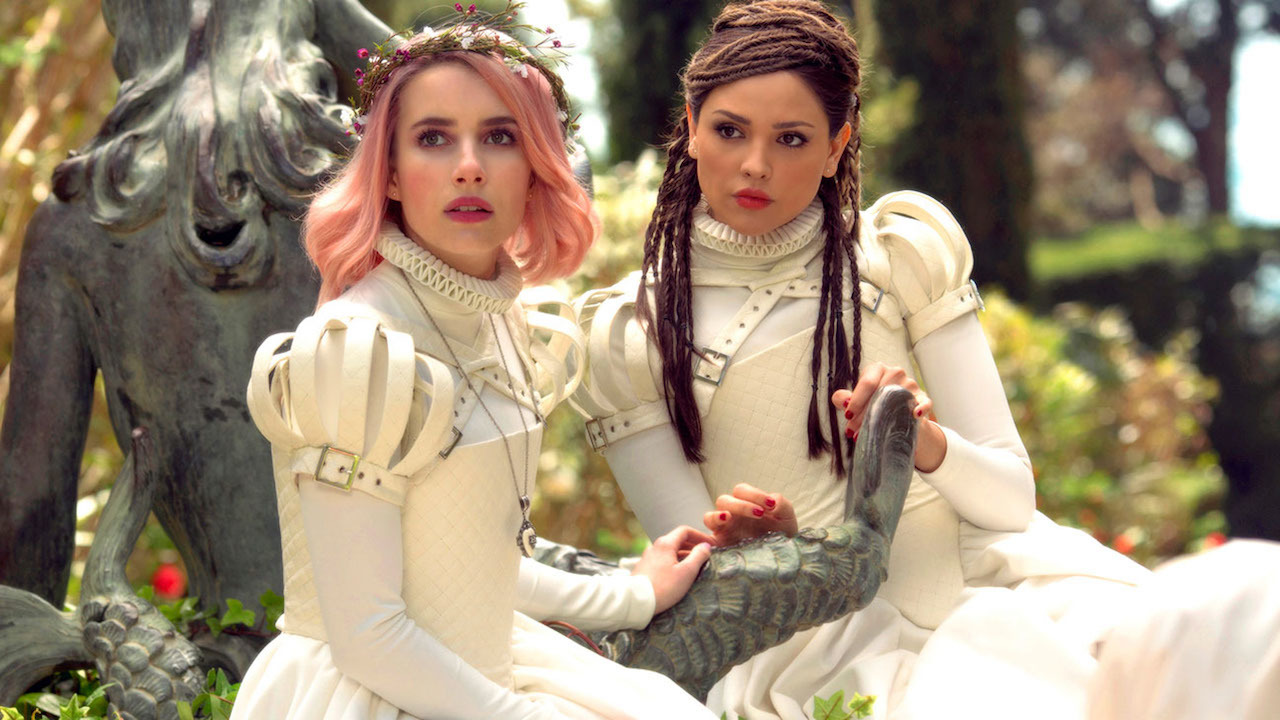
Vivid colors and chic camera choreography are beautifully bound together in the initial scenes of Alice Waddington’s feature length directorial debut, the erratic yet always elegant sci-fantasy Paradise Hills. But it’s a film that opens perhaps too big; Waddington playfully presents a richly imagined world that’s part musical, part mystery, and overfull with intrigue and possibility. Like the illusory love child of Dhonielle Clayton’s “The Belles” and William F. Nolan and George Clayton Johnson’s “Logan’s Run” it hits the viewer hard and fast. A neon-lit, Mediterranean swayed Shangri-La that, before long exasperates the audience.
Yes, there’s a story amidst the eye-popping production design from Laia Colet, a rather convoluted and cloudy one from Waddington, Brian DeLeeuw, and Nacho Vigalando. Though it all begins rather simply––a shame the story didn’t stay more simplistic, as the dazzling visuals can only carry so much––with Uma (Emma Roberts), after a brief operatic preface, suddenly awakens with no provocation, on a lush island called Paradise.
Instantly understanding she’s a prisoner here, she soon finds that her rose garden-addled and Escher-inspired environs is actually a rehab-like facility for young women, headed by The Duchess (Milla Jovovich). Uma has been placed in this odd but opulent facility at the behest of her busy-body parents who want their daughter to be up to snuff and marriage material for Son (Amaud Valois), who belongs to the same snooty upper-crust royalty as they, even though Uma is in love with a poor boy (of course!) played by Jeremy Irvine.
Other young women reluctantly kept at Paradise include Amarna (Eiza González), Chloe (Danielle Macdonald, and Yu (Awkwafina), and before long they’ve bonded and suspect all sorts of sinister deeds that of course are unfolding behind the scenes. When the Duchess first meets Uma she sort of gives it all away when she says: “Some people complain that rose bushes have thorns, I rejoice that thorn bushes have roses.”
There’s some fun to be had in the fairytale-like unfolding of Paradise Hills. And many of the calore-rich and completely crackpot visuals are a sight to behold. The costume design from Alberto Valcárcel is decadent with retrofuturism and gothic minutiae, duly matched by Alfonso Mancha’s ostentatious set decoration and the shifting cinematography from Josu Inchaustegui. But after an hour or less (decidedly less) Paradise Hills becomes overcooked. A classic case of too many ingredients in the stew, each overpowering the other resulting in gaudy goop.
The acting is fine, if a little over-the-top in the case of Jovovich, but she’s the villain, so that’s okay. Her Duchess is campy on occasion, and that works best considering the steep cliffs Paradise Hills throw the viewer down. It’s a real tragedy that a film that begins with such high concept designs and such jaw-dropping study should become such a mixed bag of bland.
Waddington’s film looks absolutely astounding, it’s a drop-dead gorgeous production, worth a recommendation for those merits alone. But the eye candy is all empty calories and upsets the tummy. For all the visual spectacle there’s just as much that galls and grates. For instance, Waddington ends it all with a cliché crane shot to force an emotional response that’s sadly too close to retching.
Taste of Cinema Rating: 2.5 stars (out of 5)
Author Bio: Shane Scott-Travis is a film critic, screenwriter, comic book author/illustrator and cineaste. Currently residing in Vancouver, Canada, Shane can often be found at the cinema, the dog park, or off in a corner someplace, paraphrasing Groucho Marx. Follow Shane on Twitter @ShaneScottravis.